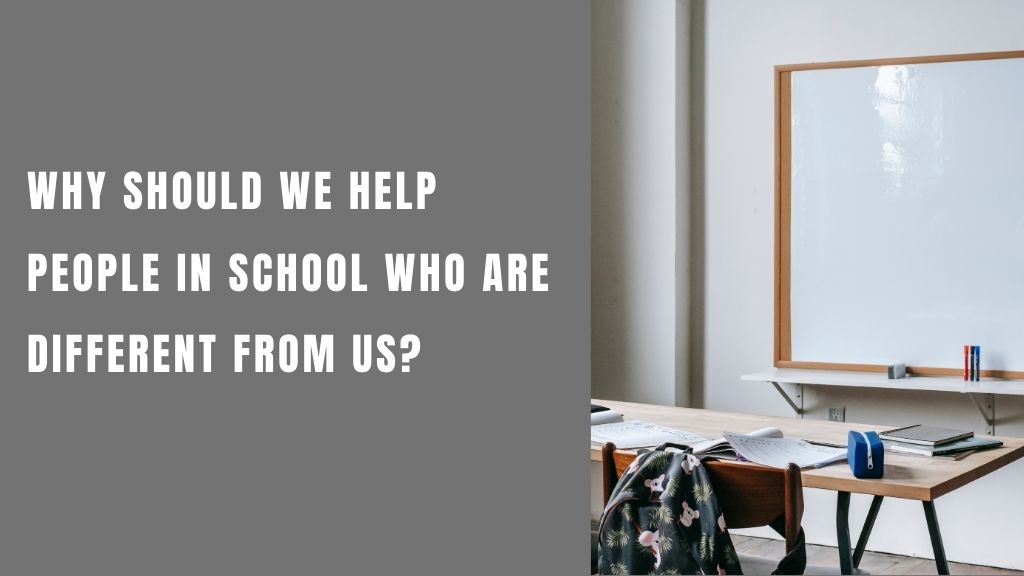Why should we help people in school who are different from us? Schools are filled with students from different backgrounds, cultures, abilities, and beliefs. Embracing these differences makes our school environment more inclusive and welcoming. When we support and help others, we foster kindness, empathy, and respect. Understanding the importance of helping others also makes us better individuals and strengthens our community.
In this blog, we will explore why it is essential to help people who are different from us, how it benefits everyone, and how we can take simple steps to offer support and kindness.
Why Should We Help People in School Who Are Different From Us?
1. Understanding Differences
Every student is unique. Differences can be based on culture, religion, language, abilities, appearance, or personal experiences. Understanding these differences helps us to appreciate others and recognize their value. Schools are a place for learning, not just academically, but also socially and emotionally. When we interact with people who are different, we expand our perspectives and become more open-minded.
Some common differences include:
- Cultural Diversity: Students may celebrate different holidays, eat unique foods, or speak various languages.
- Physical and Learning Abilities: Some students may have disabilities or learning challenges that require extra support.
- Economic Backgrounds: Not all students have access to the same resources or experiences.
Recognizing and understanding these differences allows us to respond with kindness and empathy.
Also read: How Can a Teacher Ensure That All Students Are Actively Participating in the Classroom?
2. Building Empathy and Compassion
Helping others teaches us empathy — the ability to understand and share the feelings of others. When we put ourselves in someone else’s shoes, we realize the challenges they might be facing. Compassion grows when we act to support and comfort others.
For example:
- Helping a classmate with a learning difficulty shows patience and understanding.
- Standing up against bullying demonstrates courage and kindness.
- Listening to a friend who is struggling builds emotional support.
Empathy and compassion are essential life skills that contribute to personal and social growth.
3. Promoting Inclusion and Belonging
Inclusion means making sure everyone feels valued and accepted. When we help others, especially those who feel left out, we create a sense of belonging. Inclusive classrooms celebrate diversity and ensure that all students participate and feel respected.
Ways to promote inclusion include:
- Inviting classmates to join group activities.
- Encouraging others to share their opinions and ideas.
- Celebrating cultural diversity through events and activities.
A supportive environment fosters friendships and makes school a happier place for everyone.
4. Enhancing Communication and Social Skills
Helping others requires effective communication. Whether it’s offering a kind word, providing instructions, or simply listening, these interactions improve our communication skills.
Additionally, when we collaborate with people from different backgrounds, we learn how to navigate various perspectives. This enhances our problem-solving skills and strengthens our ability to work in teams.
5. Fostering Mutual Respect
Respect is the foundation of any strong community. By helping others, we demonstrate respect for their experiences and perspectives. When we show kindness and understanding, others are likely to reciprocate.
Teachers and parents play a vital role in promoting respectful behavior. They can encourage students to:
- Use respectful language.
- Avoid stereotypes and assumptions.
- Recognize and appreciate differences.
6. Reducing Bullying and Discrimination
Schools can sometimes be environments where bullying and discrimination occur. However, when we actively help and support others, we stand against such negative behaviors. Being an upstander — someone who stands up for what is right — can prevent bullying and create a safer school environment.
Ways to stand up against bullying include:
- Speaking out against hurtful behavior.
- Supporting those who are being bullied.
- Reporting incidents to trusted adults.
7. Creating Stronger Friendships and Support Systems
Helping others often leads to meaningful friendships. When we show kindness, we attract positive relationships and build a strong support system. Friends who come from different backgrounds offer new perspectives and experiences that enrich our lives.
In turn, when we face challenges, these friends provide support and understanding. Strong friendships contribute to emotional well-being and resilience.
8. Learning Valuable Life Lessons
Helping others teaches valuable lessons that extend beyond the classroom. It builds character, strengthens our moral compass, and enhances our leadership abilities.
Some life lessons we gain from helping others include:
- Patience: Understanding that growth takes time.
- Gratitude: Appreciating what we have.
- Responsibility: Taking initiative to make positive changes.
These lessons shape us into responsible and compassionate individuals.
9. Encouraging a Positive School Culture
A school culture that promotes kindness and support benefits everyone. When students are encouraged to help each other, it creates a positive and welcoming atmosphere. Schools with positive cultures often see:
- Improved academic performance.
- Reduced disciplinary issues.
- Greater student engagement and participation.
Teachers and school leaders can promote such a culture by recognizing acts of kindness and creating opportunities for students to support each other.
10. How to Help Others in School
Helping others doesn’t have to be complicated. Small acts of kindness can make a big difference. Here are some simple ways to help people in school who are different from us:
- Be a Friend: Invite someone to sit with you at lunch or join your group during activities.
- Offer Assistance: Help classmates who may struggle with classwork or language barriers.
- Celebrate Differences: Participate in cultural events and learn about traditions different from your own.
- Listen: Sometimes, offering a listening ear can be the most valuable support.
- Speak Up: Stand against bullying or unfair treatment when you see it.
Every small action adds up to create a more inclusive and supportive school environment.
Also read: 20 Reasons Why Boarding School is Better Than Day School
Conclusion
So, why should we help people in school who are different from us? Because it makes our schools and communities stronger, kinder, and more inclusive. By understanding, supporting, and respecting others, we grow as individuals and contribute to a positive environment. Helping others fosters empathy, builds friendships, and teaches lifelong lessons. In a world full of diversity, these actions not only benefit those we help but also enrich our own lives. Let’s embrace our differences and make our schools a place where everyone feels valued and supported.
Next time you see someone who seems different or in need, remember the impact your kindness can have. Every act of help, no matter how small, makes a difference. Together, we can build a more compassionate and inclusive school community.

